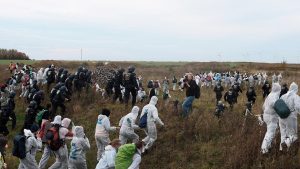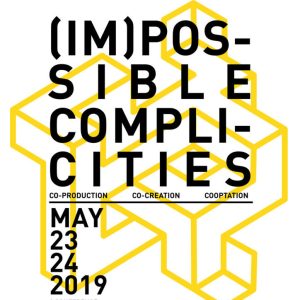
English version below
Autorecupero dei Beni Comuni
Martedi 30 Marzo 2021, h. 17
seminario online
La pratica dell’ autogestione dei beni comuni si rivela essenziale per riattivare territori e contrastare la diseguaglianza. L’ auto-costruzione da parte dei cittadini fornisce un modello efficace ed economico con cui recuperare o costruire ex-novo risorse sul territorio, ma allo stato attuale nelle politiche pubbliche è una pratica applicata soprattutto nel contesto dell’edilizia residenziale.
Come possiamo rafforzare la capacità di autorecuperare spazi pubblici gestiti come commons tramite il lavoro delle comunità che li usano, animano, reinventano? Quali strumentazioni esistono per applicare modelli di autocostruzione a progetti comunitari gestiti da collettivi informali nel contesto delle normative vigenti? Quali figure e competenze sono essenziali alla riuscita di processi di autorecupero di beni comuni?
Nel corso di questo incontro pubblico cercheremo di trovare delle risposte insieme ai protagonisti di una serie di sperimentazioni sul campo in corso sul territorio italiano.
L’incontro avviene nell’ambito di uno studio per conto del Comune di Napoli affidato a Lorenzo Tripodi (e condotto con la collaborazione volontaria del team Tesserae) nell’ambito del progetto URBACT Civic e-State. Lo scopo è di tracciare delle linee guida per il processo di autorecupero dei beni comuni attraverso autocostruzione. Dopo aver identificato ed intervistato nella prima fase una serie di esperienze che hanno sperimentato in diversi ambiti processi di autocostruzione sul territorio nazionale abbiamo scelto di aprire un confronto diretto tra i protagonisti di queste pratiche innovative per ricevere un feedback sulle prime proposte per un regolamento cittadino che sta prendendo forma nel contesto napoletano. L’intento è di avviare un processo di condivisione di conoscenza che costituisca come bene comune la stessa capacita diffusa di intervento delle comunità sui beni comuni.
Interventi
- Dariuche Dowlatchahi, Firenze. Progettista e Direttore dei lavori nei cantieri dell’ex Asilo Ritter, Melograno Hausprojeckt, Cecco Rivolta (bando Regione Toscana. 51/2004)
- Laura Pommella / Sara Campanelli, Ass. A.r.i.a Familiare
- Francesco Fulvi / Tania Comelli – Manifattura Urbana, Parma
- Giovanni Ginocchini, fondazione per l’innovazione Urbana Bologna – Laboratorio Spazi
- Antonio Bagni / Diego Detassis ND Studio, Firenze
- Werther Albertazzi, Planimetrie Culturali Aps, Bologna
- Alberto Razzi, Ass. Ventipietre, Bologna
- Luca Vandini, Instabile Portazza / Kiez agency, Bologna
- Gli abitanti autorecuperanti di Via Dazzi, Cecco Rivolta, Firenze
- Giulio Grillo, ReBiennale / Agenzia Sociale per la Casa (ASC) Venezia
La discussione introdotta da Roberta Nicchia, URBACT Local Group Coordinator per la città di Napoli – progetto Civic eState, sarà moderata da Lorenzo Tripodi, Laura Colini (Tesserae) e Anna Lisa Pecoriello (MHC Progetto Territorio), e vedrà la partecipazione di rappresentanti della Rete dei Beni Comuni di Napoli e dell’ URBACT Local Group.
Info
Lorenzo Tripodi
lorenzo(at)tesserae.eu
La discussione avverrà sulla piattaforma Zoom (link nel programma)
Scarica il programma in PDF
—————————————————————————————————————————-
Conference: Citizen-Led Regeneration of the Civic Commons
Tuesday March 30th 2021 – 17:00
The practice of self-management of the commons is essential to regenerate territories and combat inequality. Citizen-led self-building provides an effective and economical model for recovering urban territories or building up new ones from scratch, but current public policy only makes allowance for such practices in the context of housing.
How can we strengthen capacity for the self-recovery of public buildings, managed as commons, through the work of the communities that use and rebuild them?
What tools and models exist for enabling citizen-led community self-building projects managed by informal collectives within current regulations?
What roles and skills are essential for the success of such projects?
During this public conference we will try to find answers to these questions together with activists currently experimenting in this field in Italy.
The conference is part of a larger study on behalf of the City of Naples overseen by Tesserae lead researcher Lorenzo Tripodi within the URBACT Civic e-State project. The study’s aim is to create guidelines for community-led regeneration of urban commons. Following on from an initial phase of knowledge gathering via interviews with community self-builders, we have organized this conference as an opportunity to open up the discussion to larger networks of practice and to gain deeper insights and feedback from activists, researchers and policy makers engaged with this fascinating and dynamic emerging theme in European urban governance. It is our intention that the outcomes of this work will contribute to the creation of prosperous community commons, knowledge sharing and better policy and practice in this field.
The conference will be held in Italian.


